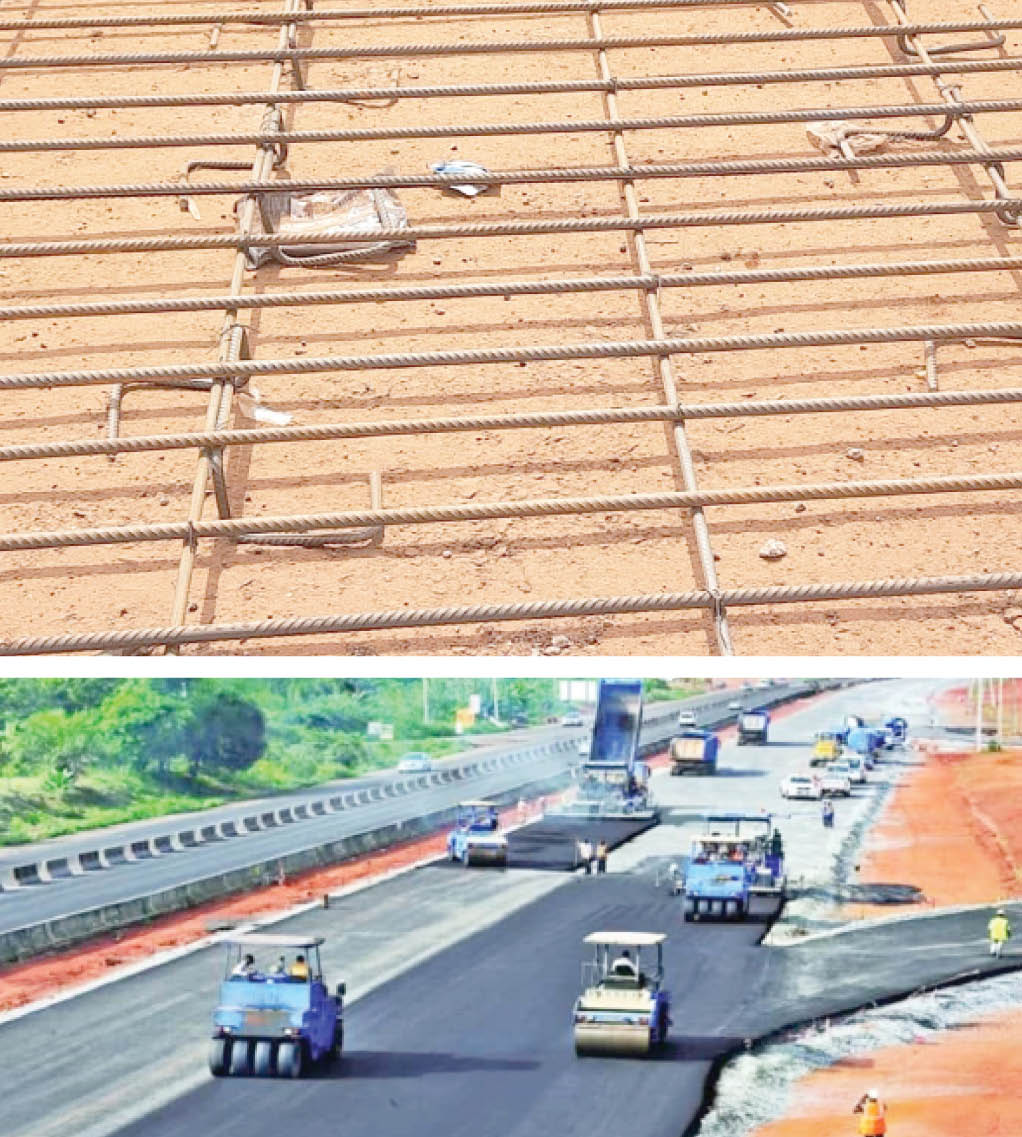After assumption of office, Nigeria’s new Minister of Works, David Umahi, proposed the use of concrete instead of asphalt for road construction arguing that there would be lower maintenance costs and fewer repairs needed over time if concrete is used.
Asphalt roads, most common in Nigeria
With the exception of a few, roads in Nigeria are made of asphalt, the bitumen derivative, and the country is believed to have abundant deposits of bitumen, the main component of asphalt, in Ondo, Ogun and many other parts of the country.
According to studies, the country has a proven reserve of about 42.47 billion tons of bitumen which when fully explored and utilised, will halt the import of the commodity, reduce costs and speed up road construction in the country.
The minister had in October announced that about N217 billion is needed for 269 road projects across the country.
- Kaduna oldest market reopens after 3 years
- Kidnappers hold FCT chief, 3 kids, release wife to raise ransom
The Ministry of Works was allocated N300 billion in the N2.176 trillion Supplementary Budget recently approved by the National Assembly to attend to some contractual commitments in the ongoing road projects.
However, the minister was also recently quoted by his Chief Press Secretary, Orji Uchenna, while speaking at a meeting with the Minister of Steel Development, Shuaib Audu, saying that, $35 billion is needed to kick start the construction of concrete roads nationwide.
“We need a lot of money to start but we decided to face it and God has given us an idea. We need about 35 billion dollars to start. If we start waiting for the FG it might become difficult.
“We did Return On Investment (ROI). The profit we could have made, part of it will go to bank interest, we are looking at commercial banks but the Federal Executive Council has to endorse it.”
The minister argued that concrete is more resistant to fire and strain than asphalt and has more durability, environmental benefits and safety.
The minister said he was not insisting that all ongoing road construction in the country should be changed to concrete.
“I did 3,500 kilometres of concrete road in Ebonyi State, and it is maintenance free. For 50 years, you would not maintain it.
“I have directed that all the ‘no objections’ my ministry submitted to the BPP be returned. We need to look at the new method of constructing our roads based on our climate.
“Those that want to continue with asphalt will have to assure us that all roads constructed with asphalt pavement must be on concrete shoulders; alternative design on the road shoulder, no shoulder on roads with surface dressing.
Proponents of the minister’s new idea have argued that locally sourced materials for road construction can help reduce costs and support the local economy.
They believed that, when traffic volume is considered, concrete may be more suitable for roads with heavy traffic as it can withstand more wear and tear over time.
It could be recalled that Dangote Industries Limited (DIL) constructed the 43-kilometre Obajana-Kabba road using concrete in 2021 to provide a strong alternative on the strategic highway between the North and South of the country.
The Group also commissioned the 26-kilometre Itori-Ibese concrete road as part of its Corporate Social Responsibility projects.
The concrete, asphalt politics
The debate on whether to use concrete or asphalt for Nigerian roads surfaced at the House of Representatives as two opposing views were expressed about the issue after the minister of works spoke about his plan.
The Chairman of the House Committee on Works, Akinola Alabi, supported Umahi’s proposal and assured that the committee would collaborate with the Ministry of Works and its agencies to promote interventions that will bring transformation to Nigerian roads.
He said, “”On every sitting day in the House, the committee receives nothing less than two to three referrals on motions from members drawing attention to road infrastructure in their constituency, calling for attention. There is no doubt that the situation of our road infrastructure is highly deplorable.
“That is why we need to swing into action immediately. Though the last government carried out some initiatives, policies and interventions on road infrastructure, we need to review some of these ideas and determine their workability or effectiveness in addressing our general concerns.”
However, Rep Khadija Bukar Abba moved a motion calling on the Ministry of Works to suspend its plan for adopting concrete for road construction citing various factors that must be looked into before taking such a decision.
She argued that several studies have revealed significant technical limitations and constraints associated with using rigid/cement concrete pavements in road construction.
According to her, the minister’s new policy on concrete pavement was without in-depth studies of the comparative advantages or disadvantages of asphalt.
The lawmaker said it contradicts technical specifications in existing contracts, potentially leading to contract breaches and potential arbitration and litigations during a challenging economic time.
Experts speak
However, experts who are skeptical about the use of concrete in road construction said it is typically more expensive than asphalt.
They noted that the initial costs of materials and labour can be significantly higher, which could limit the number of roads that can be constructed.
An engineer, Habibu Mudi, said the decision was hasty because there are peculiarities that warrant building roads or other ‘rigid pavements’ using concrete.
He said, “There are reasons that warrant using concrete or what we call ‘hard pavements’. In engineering, bitumen roads are called ‘flexible pavements’. What we meant by ‘flexible’ is that, bitumen melts and becomes more infused and strong with the other elements. The other one that is made using concrete is called ‘rigid pavement’.
“In terms of strength, the ‘rigid pavement’ is stronger, but it is not used on a large stretch of highways that are several kilometers long.
“Rigid pavement is mostly used at airports and other places because of their nature and for specific purposes. It is also used at places where trailers and other heavy-duty vehicles are concentrated like the ports.
“However, they are not used on roads running up to like 50 or hundreds of kilometers. It is not advisable to construct rigid pavements on such roads.
“First of all, it is very expensive, far more expensive than bitumen. The thickness of the concrete to be used because of the iron rods, cement and other elements makes it very expensive. Iron rod is also very expensive. You cannot compare it with bitumen.
“Another thing is, that bitumen roads are easier to maintain if there is any damage or collapse at a section. In laying concrete, here is something we call `expansion joint’. You cannot lay concrete without this joint, which is the one used in bridges.
“Concrete starts failing from those expansion joints due to pressure or damage. Whenever it is damaged, repairing it is very hard and it is more dangerous than potholes on bitumen roads that can easily be repaired.
“Such failed sections on concrete roads will cause more accidents multiple times than if it is a bitumen road pothole because of iron rods and other elements.
“The concrete roads Umahi constructed in his state have started failing. He constructed them in Ebonyi and they are collapsing. I have seen them and I have the pictures of how they were severely damaged. These are factors that are to be considered.
“Bitumen is far better because of its flexibility while concrete is not. It is very rigid and a crack will make it collapse because the elements will get weaker under the weight of passing vehicles or any other pressure.
“That is why ‘rigid pavements’ are constructed at airports because an aircraft is very heavy, so it is not advisable to use bitumen surfaces there.
“Umahi is not an engineer. He is an administrator. He shouldn’t have made the decision known in the first place. He should have formed a committee of experts to make all the necessary research and give him a report,” Engineer Habibu said.
Another expert and a player in the construction industry, Mu’azzam Ado, said the idea of using concrete will have multiplier negative effects in the country.
According to him, the use of concrete to construct roads will trigger an increase in the price of cement, iron rods and other elements which will affect the construction industry.

 Join Daily Trust WhatsApp Community For Quick Access To News and Happenings Around You.
Join Daily Trust WhatsApp Community For Quick Access To News and Happenings Around You.

